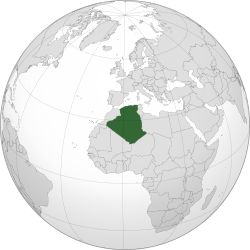LGBTQ rights in Algeria | |
|---|---|
 | |
| Legal status | Illegal since 1966 [1] |
| Penalty | Up to 3 years imprisonment with fines up to 10,000 dinars. [2] |
| Gender identity | No |
| Military | No |
| Discrimination protections | None |
| Family rights | |
| Recognition of relationships | No recognition of same-sex relationships |
| Adoption | No |
Lesbian, gay, bisexual, transgender and queer or questioning (LGBTQ) people in Algeria face legal challenges and discrimination not experienced by non-LGBTQ residents. According to the International Lesbian and Gay Association's May 2008 report, both female and male same-sex sexual acts are illegal in Algeria. [3] Homophobic attitudes are normalised within Algerian society, and LGBTQ people are commonly subjected to discrimination and potential arrest. [4]